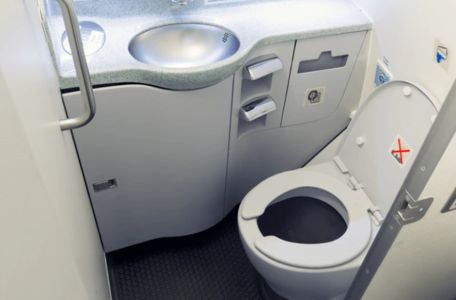Aeroplane toilets found to carry five dangerous pathogens entering Australia
By
Gian T
- Replies 0
If you thought the worst thing about aeroplane toilets was the cramped space and questionable smells, think again.
New research has uncovered that these tiny cubicles in the sky are harbouring something far more concerning—dangerous pathogens and antibiotic-resistant superbugs making their way into Australia.
A team led by the CSIRO, Australia’s national science agency, has uncovered a worrying new pathway for disease: the wastewater from aeroplane toilets.
In a groundbreaking study, scientists analysed 44 wastewater samples from international flights landing in Australia.
The results is every single sample contained superbugs, and nearly a third tested positive for a gene that resists even our last-resort antibiotics—a gene never before detected on Australian soil.
Why does this matter? Well, antimicrobial resistance (AMR) is one of the biggest threats to global health today.
When bacteria become resistant to antibiotics, our ability to treat common infections and perform routine medical procedures is put at risk.
The fact that these superbugs are now arriving via international flights is a wake-up call for all of us.
Dr Warish Ahmed, principal research scientist at CSIRO, explained that monitoring aircraft wastewater could become a powerful tool in our fight against the spread of new diseases.
‘The samples could be delivered to labs, and we could simply run PCR tests, looking for antibiotic-resistant genes and bacteria and offer the results in a couple of days,’ he said.
But, as with most things, it would require collaboration between airlines, universities, and public health authorities to make it a reality.
Where are these superbugs coming from? The study found that flights from South Asia had a much higher concentration of antibiotic-resistant genes than those from Europe.
In many parts of Asia, antibiotics are available over the counter without a prescription, which can accelerate the development of resistance.
Other factors—like water quality, sanitation, population density, and public health policies—also play a role.
Dr Yawen Liu, the study’s lead author and a visiting scientist from China’s Xiamen University, highlighted the importance of early detection: ‘By monitoring aircraft wastewater, we can potentially detect and track antibiotic resistance genes before they become established in local environments.’
The research began during the COVID-19 pandemic, when the world was already on high alert for new and emerging diseases.
Despite the use of strong disinfectants in aeroplane wastewater treatment systems, the study found that pathogens were still present—proving just how tough these superbugs can be.
This international collaboration between CSIRO, Xiamen University, the University of South Australia, and Michigan Technological University has been published in the journal Microbiology Spectrum, and it’s already making waves in the scientific community.
So, what does this mean for us here in Australia? While there’s no need to panic, it’s a timely reminder of how interconnected our world has become—and how quickly diseases can travel across borders.
It also highlights the importance of robust public health systems, responsible antibiotic use, and ongoing research to keep us all safe.
What can you do? While you can’t control what’s lurking in aeroplane toilets, you can help slow the spread of antibiotic resistance by only using antibiotics when prescribed, finishing the full course, and never sharing medications with others.
And if you’re travelling overseas, be mindful of local health practices and hygiene standards.

Have you ever had a health scare after travelling? Share your stories and tips in the comments below, and let’s keep the conversation going about how we can all stay healthy in our increasingly connected world.
Read more: Experts raise alarms for a health threat straight out of war zones. Should Aussies be on alert?
New research has uncovered that these tiny cubicles in the sky are harbouring something far more concerning—dangerous pathogens and antibiotic-resistant superbugs making their way into Australia.
A team led by the CSIRO, Australia’s national science agency, has uncovered a worrying new pathway for disease: the wastewater from aeroplane toilets.
In a groundbreaking study, scientists analysed 44 wastewater samples from international flights landing in Australia.
The results is every single sample contained superbugs, and nearly a third tested positive for a gene that resists even our last-resort antibiotics—a gene never before detected on Australian soil.
Why does this matter? Well, antimicrobial resistance (AMR) is one of the biggest threats to global health today.
When bacteria become resistant to antibiotics, our ability to treat common infections and perform routine medical procedures is put at risk.
The fact that these superbugs are now arriving via international flights is a wake-up call for all of us.
Dr Warish Ahmed, principal research scientist at CSIRO, explained that monitoring aircraft wastewater could become a powerful tool in our fight against the spread of new diseases.
‘The samples could be delivered to labs, and we could simply run PCR tests, looking for antibiotic-resistant genes and bacteria and offer the results in a couple of days,’ he said.
But, as with most things, it would require collaboration between airlines, universities, and public health authorities to make it a reality.
Where are these superbugs coming from? The study found that flights from South Asia had a much higher concentration of antibiotic-resistant genes than those from Europe.
In many parts of Asia, antibiotics are available over the counter without a prescription, which can accelerate the development of resistance.
Other factors—like water quality, sanitation, population density, and public health policies—also play a role.
Dr Yawen Liu, the study’s lead author and a visiting scientist from China’s Xiamen University, highlighted the importance of early detection: ‘By monitoring aircraft wastewater, we can potentially detect and track antibiotic resistance genes before they become established in local environments.’
The research began during the COVID-19 pandemic, when the world was already on high alert for new and emerging diseases.
Despite the use of strong disinfectants in aeroplane wastewater treatment systems, the study found that pathogens were still present—proving just how tough these superbugs can be.
This international collaboration between CSIRO, Xiamen University, the University of South Australia, and Michigan Technological University has been published in the journal Microbiology Spectrum, and it’s already making waves in the scientific community.
So, what does this mean for us here in Australia? While there’s no need to panic, it’s a timely reminder of how interconnected our world has become—and how quickly diseases can travel across borders.
What can you do? While you can’t control what’s lurking in aeroplane toilets, you can help slow the spread of antibiotic resistance by only using antibiotics when prescribed, finishing the full course, and never sharing medications with others.
And if you’re travelling overseas, be mindful of local health practices and hygiene standards.
Key Takeaways
- Five high-priority pathogens and superbugs, including some with resistance to last resort antibiotics not previously seen in Australia, have entered the country via international flight toilet wastewater.
- Researchers found superbugs in every one of the 44 aircraft wastewater samples tested, with flights from South Asia showing higher concentrations of antibiotic-resistant genes compared to those from Europe.
- Experts say monitoring aircraft wastewater could be an effective early warning system for tracking and preventing the spread of new diseases and antimicrobial resistance in Australia, but would require collaboration between airlines, universities and public health units.
- The study, conducted by CSIRO with partners in China, South Australia and the US, highlights concerns about global antibiotic resistance and the need for monitoring as even strong disinfectants in aircraft don’t stop pathogens being present in wastewater.
Read more: Experts raise alarms for a health threat straight out of war zones. Should Aussies be on alert?








